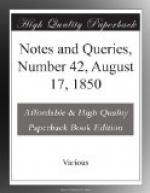Chaucer uses for the newe and of the newe (sc. fashion) elliptically. Tiding or Tidings, from the A.-S. Tid-an, evidently preceded newes in the sense of inteligence, and may not newes therefore be an elliptic form of new-tidinges? Or, as our ancestors had newelte and neweltes, can it have been a contraction of the latter? If we are to suppose with Mr. Hickson that news was “adopted bodily into the language,” we must not go to the High-German, from which our early language has derived scarcely anything, but to the Neder-Duytsch, from the frequent and constant communication with the Low Countries in the sixteenth century. The following passages from Kilian’s Thesaurus, printed by Plantin, at Antwerp, in 1573, are to the purpose, and may serve to show how the word was formed:—
“Nieuwtijdinge,
oft wat nieuws, Nouvelles, Nuntius vel
Nuntium.”
“Seght ons wat nieuws,
Dicte nous quelquechose de nouveau,
Recita nobis aliquid novi.”
“Nieuwsgierich, nygierich,
Convoiteux de nouveautez, Cupidus
novitatis.”
I trust these materials may be acceptable to your able correspondents, and tend to the resolution of the question at issue.
S.W. SINGER.
Mickleham, August 6. 1850.
“News,” Origin of the Word (Vol. i., pp. 270. 369. 487.; vol. ii., pp. 23. 81. 106.).—Your correspondents who have written upon this subject may now have seen the following note in Zimperley’s Encyclopaedia, p. 472.:—
“The original orthography was newes, and in the singular. Johnson has, however, decided that the word newes is a substantive without a singular, unless it be considered as singular. The word new, according to Wachter, is of very ancient use, and is common to many nations. The Britons, and the Anglo-Saxons, had the word, though not the thing. It was first printed by Caxton in the modern sense, in the Siege of Rhodes, which was translated by John Kay, the Poet Laureate, and printed by Caxton about the year 1490. In the Assembly of Foulis, which was printed by William Copland in 1530, there is the following exclamation:—
“‘Newes! newes! newes! have ye ony newes?’
“In the translation of the Utopia, by Raphe Robinson, citizien and goldsmythe, which was imprinted by Abraham Nele in 1551, we are told, ’As for monsters, because they be no newes, of them we were nothynge inquysitive.’ Such is the rise, and such the progress of the word news, which, even in 1551, was still printed newes!”
W.J.
Havre.
* * * * *
FOLK LORE.
Charming for Warts (Vol. i., p. 19.; vol. ii. p. 150.).—In Lord Bacon’s Sylva Sylvarum, or a Natural History in Ten Centuries (No. 997.), the great philosopher gives a minute account of the practice, from personal experience, in the following words:—




